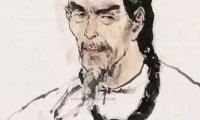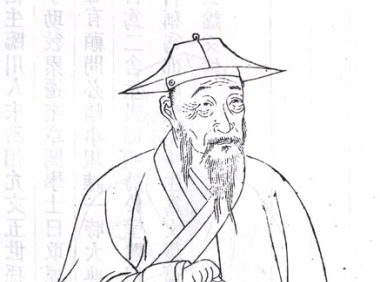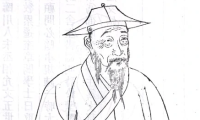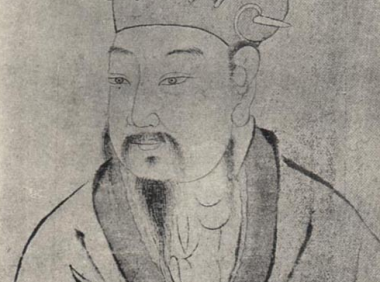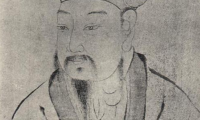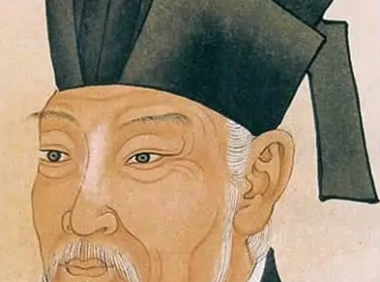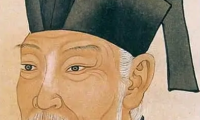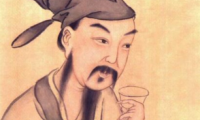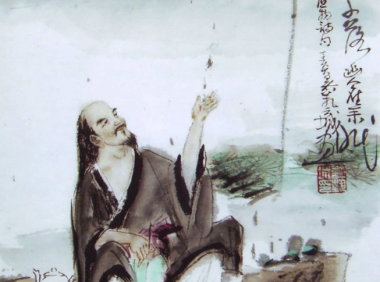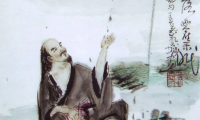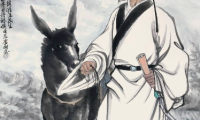-
Gong Zizhen Poem: Miscellanies of the Year 1839 – 龚自珍《己亥杂诗》
己亥杂诗 (三一五其五) [清]龚自珍 浩荡[1]离愁[2]白日[3]斜, 吟鞭[4]东指即天涯。 落红[5]不是无情物, 化作春泥更护花。 注释: [1]浩荡:广大无边,这里形容愁思无穷无尽。 [2]离愁:离别的愁思。 [3]白日:太阳。 [4]吟鞭:诗人的马鞭。 [5]落红:落花。花朵以红色者居多。因此又称落花为落红。这二句用来比喻自己虽辞官,但仍会关心国家的命运。 Miscellanies of the Year 1839 (V) Gong Zizhen[1] My parting grief is boundless when the sun sinks low; Eastward I point my whip and far away I'll go. The fallen blossoms are not an unfeeling thing; Though turned to mud, they'd nurture flowers' growth next spring. 注释: [1]The poet left the court when his proffered service to Commissioner Lin Zexu was rejected. 己亥杂诗 (三一五其一二五) [清]龚自珍 九州[1]生气[2]恃[3]风雷, 万马齐喑[4]究[5]可哀。 我劝天公[6]重抖擞[7], 不拘一格降[8]人才。 注释: [1]九州:中国。 [2]生气:生气勃勃的局面。 [3]恃:依靠。 [4]喑:哑。万马齐喑,比喻社会政局毫无生气。 [5]究:终究,毕竟。 [6]天公:明指天上主宰一切的玉皇大帝,暗指人间至高无上的皇帝。 [7]抖擞:振作精神。 [8]降:降生。 Miscellanies of the Year 1839 (CXXV) Gong Zizhen From wind and thunder comes a nation's vital force, What a great pity not to hear a neighing horse! I urge the Lord of Heaven[1] to brace up again, And send down talents of all kinds to Central Plain.[2] 注释: [1]This stanza was a prayer written for a Taoist temple; by the Lord of Heaven the poet alluded to the emperor. [2]Another version of the last couplet reads as follows: O Lord of Heaven, please brace up as I beseech And send down talents to earth with freedom of speech. "Miscellaneous Poems of Ji Hai" is a collection of seven-character quatrains by the Qing…...
- 0
- 0
- 51
-
Yu Ji Poem: Elegy on Premier Wen Tianxiang – 虞集《挽文丞相》
挽[1]文丞相[2] [元]虞集 徒把金戈挽落晖[3], 南冠[4]无奈北风[5]吹。 子房[6]本为韩仇出, 诸葛[7]宁[8]知汉祚[9]移。 云暗鼎湖[10]龙去远, 月明华表鹤归迟[11]。 不须更上新亭[12]望, 大不如前洒泪时。 注释: [1]挽:哀悼,缅怀。 [2]文丞相:南宋末民族英雄、文学家文天祥,号文山,德祐二年(1276)任右丞相,至元十九年(1283)在燕京就义。 [3]金戈挽落晖:常用于比喻人力胜天。此句反用其意,意谓落日难挽。此处以“落晖”比喻垂亡的宋朝。 [4]南冠:比喻囚犯。 [5]北风:这里暗指来自北方的强大势力。 [6]子房:指张良,西汉初大巨,是韩国贵族的后裔,为报家国之仇,结交刺客狙击秦始皇未中。 [7]诸葛:指诸葛亮。 [8]宁:岂。 [9]祚:皇位。 [10]鼎湖:本是指传说中黄帝乘龙上天的地方,这里指宋朝国君蒙难。 [11]鹤归迟:此句用汉代丁令威化作仙鹤的传说,借指文天祥的忠魂也已化为仙鹤,但迟迟不见归来。 [12]新亭:又名劳劳亭,在今江苏南京市南。 Elegy on Premier Wen Tianxiang[1] Yu Ji In vain you wielded spear to raise the setting sun. How could a Southern captive stop the north wind's run! The hammer blow could not revenge the conquered State. How could the premier change the Western Kingdom's fate! Frow cloudy Tripod Lake the dragon's[2] far away. On moonlit pillar could the immortal crane stay? Why should we northward gaze again from Southern Tower? Where on the conquered Southern shore can our tears shower! 注释: [1]Wen Tianxiang (1232—1286), last premier of the Southern Song Dynasty, was captured by the Yuan army and executed. [2]The sun and the dragon refer to the last emperor of the Song Dynasty, and the crane to Wen Tianxiang's soul. "Mourning Prime Minister Wen" is a seven-character regulated verse written by the early Yuan poet Yu Ji, mourning the national hero Wen Tianxiang of the Southern Song Dynasty. The first six lines of the poem recall Wen Tianxiang's deeds and express emotion; the last two lines express the author's grief that reality is "not as good as before".…...
- 0
- 0
- 10
-
Liu Yin Poem: On Seeing the Mume Flower – 刘因《观梅有感》
The poem "On Seeing the Mume Flower " is a seven-line poem written by Liu Yin, a poet of the Yuan Dynasty....
- 0
- 0
- 19
-
白居易《后宫词》 – Bai Juyi English Translations – Chinese Poems
Bai Juyi 后宫词 泪湿罗巾梦不成, 夜深前殿按歌声[1]。 红颜未老恩先断, 斜倚熏笼[2]坐到明。 这首诗是代宫女所作的怨词。第一句“泪湿罗巾”写宫女等待君王不来,哭得泪眼不干,这是怨的外形,是第一层怨。等待的结果是失望,只好寻梦,梦又不成,这是第二层怨。梦不成却听见前殿歌声,说明君王正在寻欢作乐,但是没有自己陪伴,这是第三层怨。如果自己年龄大了,失宠倒也情有可原,偏偏红颜未老,这是第四层怨。如果从来没有受过恩宠倒也罢了,偏偏是受宠之后恩断,这是第五层怨。恩断还不死心,却要斜倚熏笼一直等到天明,这是第六层怨。全诗由希望转到失望,由失望转到苦望,由苦望最后转到绝望;由现实进入幻想,由幻想进入痴想,由痴想再回到现实,千回百转,倾注了诗人对宫女的深挚同情。 注释: [1]按歌声:按照歌声的韵律打节拍。 [2]熏笼:覆罩香炉的竹笼,古时一种烘烤和取暖的用具,用来熏衣被等。 The Deserted Her handkerchief soaked with tears, she cannot fall asleep, But overhears band music waft when night is deep. Her rosy face outlasts the favor of the king; She leans on her perfumed bed till morning birds sing....
- 0
- 0
- 36
-
Du Mu: To Han Chuo, Magistrate of Yangzhou ~ 《寄扬州韩绰判官》 杜牧 with English Translations
《寄扬州韩绰判官》是唐代诗人杜牧离开扬州以后怀念昔日同僚韩绰判官而作。 Du Mu 《寄扬州韩绰判官》 杜牧 青山隐隐水迢迢,秋尽江南草未凋。二十四桥明月夜,玉人何处教吹箫? To Han Chuo, Magistrate of Yangzhou Du Mu Green mountains loom afar and streams off flow;Fall's gone but grasses in South still well grow.When moon shines on the Twenty-Four Bridge bright,Where are you teaching flute-blowing tonight?...
- 0
- 0
- 77
-
Wei Yingwu: Reply to Ceremony Director Yang Ling
Wei Yingwu Reply to Ceremony Director Yang Ling 答杨奉礼 多 病 守 山 郡自 得 接 嘉 宾。不 见 三 四 日旷 若 十 馀 旬。 临 觞 独 无 味对 榻 已 生 尘。一 咏 舟 中 作酒 雪 忽 惊 新。 烟 波 见 栖 旅景 物 具 昭 陈。秋 塘 唯 落 叶野 寺 不 逢 人。 白 事 延 吏 简闲 居 文 墨 亲。高 天 池 阁 静寒 菊 霜 露 频。应 当 整 孤 棹归 来 展 殷 勤。 Da Yang Feng Li Duo bing shou shan junZi de jie jia bin.Bu jian san si riKuang ruo shi yu xun. Lin shang du wu weiDui ta yi sheng chen.Yi yong zhou zhong zuoJiu xue hu jing xin. Yan bo jian qi luJing wu ju zhao chen.Qiu tang wei luo yeYe si bu feng ren. Bai shi yan li jianXian ju wen mo qin.Gao xian chi ge jingHan ju shuang lu pin.Ying dang zheng gu zhaoGui lai zhan yin qin. Reply to Ceremony Director Yang Had many illnesses in this mountainside prefectureJoined honored guests, were enjoyed in my own way.It has been three or four days since we were togetherBut it has felt…... -
Wei Yingwu: By Chance, Get Together in Yangzhou With Lu Geng
Wei Yingwu By Chance, Get Together in Yangzhou With Lu Geng, a Friend From Luoyang (In Luoyang We Often Rode Horses Together) 扬州偶会前洛阳卢耿主簿 楚 塞 故 人 稀相 逢 本 不 期。犹 存 袖 里 字忽 怪 鬓 中 丝。 客 舍 盈 樽 酒江 行 满 箧 诗。更 能 连 骑 出还 似 洛 桥 时? Yang Zhou Ou Hui Qian Luoyang Lu Geng Zhu Bu(Ying Wu Qing Er Luoyang Chang You Lian Qi Zhi You) Chu sai gu ren xiXiang feng ben bu qi.You cun xiu li ziHu guai bin zhong si. Ke she ying zun jiuJiang xing man qie shi.Geng neng lian qi chuHai si luo qiao shi? By Chance, Get Together in Yangzhou With Lu Geng, a FriendFrom Luoyang (In Luoyang We Often Rode Horses Together) Chu border areas rarely have old friendsWe met each other by accident.Still have your letter tucked inside my sleeveSuddenly realize both of our temples with hair white as silk. Two travelers empty the wine vessel, cup after cupLike a flowing river, poems fill up a small box.Do we still have the ability to go out for a rideLike when we occasionally rode over the bridges of the Luo…... -
Wei Yingwu: Send This From Yun Yong to Nearby Government Officials
Wei Yingwu Send This From Yun Yong to Nearby Government Officials 使云阳寄府曹 夙 驾 祗 府 命冒 炎 不 遑 息。百 里 次 云 阳闾 阎 问 漂 溺。 上 天 屡 愆 气胡 不 均 寸 泽!仰 瞻 乔 树 颠见 此 洪 流 迹。 良 苗 免 湮 没蔓 草 生 宿 昔。颓 墉 满 故 墟返 喜 将 安 宅。 周 旋 涉 途 潦侧 峭 缘 沟 脉。仁 贤 忧 斯 民贱 子 甘 所 役。公 堂 众 君 子言 笑 思 与 觌。 Shi Yun Yang Ji Fu Cao Su jia zhi fu mingMao yan bu huang xi.Bai li ci yun yangLu yan wen piao ni. Shang tian lu qian qiHu bu jun cun ze!Yang zhan qiao shu dianJian ci hong liu ji. Liang miao mian yan moMan cao sheng su xi.Tui yong man gu xuFan xi jiang an zhai. Zhou xuan she tu laoCe qiao yuan gou mai.Ren xian you si minJian zi gan suo yi.Gong tang zhong jun ziYan xiao si yu di. Send This From Yun Yong to Nearby Government Officials Early in the morning only officials are out riding in order to follow their ordersHigh noon, still cannot rest…...
- 0
- 0
- 12
-
Wei Yingwu: Send Off Vice-Magistrate Cui to Yan Chi
Wei Yingwu Send Off Vice-Magistrate Cui to Yan Chi 送淹池崔主簿 邑 带 洛 阳 道年 年 应 此 行。当 时 匹 马 客今 日 县 人 迎。 暮 雨 投 关 郡春 风 别 帝 城。东 西 殊 不 远朝 夕 待 佳 声。 Song Yan Chi Cui Zhu Bu Yi dai luo yang daoNian nian ying ci xing.Dang shi pi ma keJin ri xian ren ying. Mu yu tou guan junChun feng bie di cheng.Dong xi shu bu yuanZhao xi dai jia sheng. Send Off Vice-Magistrate Cui to Yan Chi This city on the road to LuoyangEvery year they travel here to take the imperial exams.At this time you traveled on a single horseToday you have many county people to greet you. Rain at sunset, stay over in an area outside the city gatesYou and the spring wind depart for the capital.This city close to both Luoyang and Chang’anAwait morning and evening for good news about you....
- 0
- 0
- 4
-
Wei Yingwu: Send Off Recorder Wang From Fen City
Wei Yingwu Send Off Recorder Wang From Fen City 送汾城王主簿 少 年 初 带 印汾 上 又 经 过。芳 草 归 时 遍情 人 故 郡 多。 禁 钟 春 雨 细宫 树 野 烟 和。相 望 东 桥 别微 风 起 夕 波。 Song Fen Cheng Wang Zhu Bu Shao nian chu dai yinFen shang you jing guo.Fang cao gui shi bianQing ren gu jun duo. Jin zhong chun yu xiGong shu ye yan he.Xiang wang dong qiao bieWei feng qi xi bo. Send Off Recorder Wang From Fen City In your early youth you began to leave your inked sealsYou continue on past the Fen River.The season when fragrant grasses grow everywhereYour hometown there with many dear friends. Delicate spring rain, special palace drum soundsWe in the open country, palace trees blend in with the mist.At the eastern bridge we depart from each otherLight breezes begin to arise, sunset on the waves. Notes: Fen River: Large tributary to the Yellow River in Shanxi Province....
- 0
- 0
- 8
-
Wei Yingwu: Climbing a Tower, Mail This Off to Imperial Minister Wang
Wei Yingwu Climbing a Tower, Mail This Off to Imperial Minister Wang 登楼寄王卿 踏 阁 攀 林 恨 不 同楚 云 沧 海 思 无 穷。 数 家 砧 杵 秋 山 下一 郡 荆 榛 寒 雨 中。 Deng Lou Ji Wang Qing Ta ge pan lin hen bu tongChu yun cang hai si wu qiong. Shu jia zhen chu qiu shan xiaYi jun jing zhen han you zhong. Climbing a Tower, Mail This Off to Imperial Minister Wang Climbing the forest pavilion steps, regret having to do it with different peopleThinking of the deep blue sea while inside these Chu clouds without limits. Below autumn mountains, several households beating dirt out of their clothes and blanketsWithin the cold rain, one prefecture of overgrown grasses and bushes....
- 0
- 0
- 4
-
Wei Yingwu: Send to Cartographer Liu
Wei Yingwu Send to Mid-Level Cartographer Liu 寄职方刘郎中 相 闻 二 十 载不 得 展 平 生。一 旦 南 宫 遇聊 用 写 中 情。 端 服 光 朝 次群 列 慕 英 声。归 来 坐 粉 围挥 笔 乃 纵 横。 始 陪 文 翰 游欢 燕 难 久 并。予 因 谬 忝 出君 为 沉 疾 婴。 别 离 寒 暑 过荏 苒 春 草 生。故 园 兹 日 隔新 禽 池 上 鸣。郡 中 永 无 事归 思 徒 自 盈。 Qi Zhi Fang Liu Lang Zhong Xiang wen er shi zaiBu dei zhan ping sheng.Yi dan nan gong yuLiao yong xie zhong qing. Duan fu guang zhao ciQun lie mu ying sheng.Gui lai zuo fen weiHui bi nai zong heng. Shi pei wen han youHuan yan nan jiu bing.Yu yin miu tian chuJun wei chen ji ying. Bie li han shu guoRen ran chun cao sheng.Gu yuan zi ri geXin qin chi shang ming.Jun zhong yong wu shiGui si tu zi ying. Send to Mid-Level Cartographer Liu Have heard about you for twenty yearsMost of my life not able to meet you face to face.One dawn we met in the southern palacesWe used this…...
- 0
- 0
- 9
-
Wei Yingwu: On Setting Out on the Yangtze; For Secretary Yuan ~ 韦应物·《初发扬子寄元大校书》 with English Translations
Wei Yingwu 此诗写作者在乘船离开广陵(今江苏扬州)赴任洛阳(今属河南)的途中,对友人元大的离别之情。首联写别离之“初发”;颔联写友人乘舟归去;颈联写期望重逢;尾联以舟行不定,喻世事之顺逆翻复,难以自主。全诗借景抒情,寓情于景,诗人联想到世事的难测,写得很有情致,也吐露了自己被罢官以后的心情。 韦应物·《初发扬子寄元大校书》 凄凄去亲爱,泛泛入烟雾。归棹洛阳人,残钟广陵树。今朝此为别,何处还相遇。世事波上舟,沿洄安得住。 On Setting Out on the Yangtze; For Secretary Yuan Wei Yingwu Sadly I left my dear, beloved friend;Slowly I drifted into mist and fog—no end—To Luoyang where my family is and dwells;While trees in Guangling echoed curfew bells.Early this morning did we say goodbye,Where shall we meet again? Where shall we lie?Destiny is a boat tossing on waves,Who can stay it? Not He, though He all saves!...
- 0
- 0
- 74
-
Wei Yingwu: Mooring in Xuyi County at Dusk ~韦应物·《夕次盱眙县》 with English Translations
Wei Yingwu 《夕次盱眙县》是唐代诗人韦应物的作品。这是一首写羁旅风波,泊岸停宿,客居不眠,顿生乡思的诗。诗的前四句为第一段,是写傍晚因路途风波,不得不停舫孤驿。后四句为第二段,是写人雁归宿、夜幕降临,自夜到晓不能入眠而生乡思客愁。全诗富有生活气息,侃侃诉说,淡淡抒情,看是写景,景中寓情,情由景生,景令情动。 韦应物·《夕次盱眙县》 落帆逗淮镇,停舫临孤驿。 浩浩风起波,冥冥日沉夕。 人归山郭暗,雁下芦洲白。 独夜忆秦关,听钟未眠客。 Mooring in Xuyi County at Dusk Wei Yingwu Near the town on the Huai, with the sails dropped, At a lonely moorage, my boat has stopped. The wind stirs up huge waves with all its might, And dimly sets the sun out of the sight. Men going homewards, dark grows the hill-town; The ready itself whitens with wild geese down. Sleepless, I listen to the toll all night, A most lonely stranger in homesick plight....
- 0
- 0
- 69
-
Du Fu: Met an Old Farmer, Drinking Wine Out of a Clay Pot, Then Talk of General Yan
dufu Met An Old Farmer Drinking Wine Out of a Clay Pot, Then Talk of General Yan 遭田父泥饮美严中丞 步 屧 随 春 风村 村 自 花 柳 。田 翁 逼 社 日邀 我 尝 春 酒 。 酒 酣 夸 新 尹畜 眼 未 见 有。回 头 指 大 男渠 是 弓 箭 手。 名 在 飞 骑 籍长 番 岁 时 久。前 日 放 营 衣辛 苦 救 衰 朽。 差 科 死 则 已誓 不 举 家 走。今 年 大 作 社拾 遗 能 住 杏? 叫 妇 开 大 瓶盆 中 为 吾 取。感 此 气 杨 扬须 知 风 化 首。 语 多 虽 杂 乱说 尹 终 在 口。朝 来 偶 然 出自 卯 将 及 酉。 久 客 惜 人 情如 何 拒 邻 叟?高 声 索 果 栗欲 起 时 被 肘。 指 挥 过 无 礼未 觉 村 野 丑。月 出 遮 我 留仍 嗔 问 升 斗。 Zao Tian Fu Ni Huan Mei Yan Zhong Cheng Bu xie sui chun fengCun cun zi hua liuTian weng bi she riYao wo chang chun jiu. Jiu han kua xin yinChu yan wei jian you.Hui tou zhi da nanQu shi gong jian shou.…...
- 0
- 0
- 12
-
Du Fu: Sorrows For the Emperor’s Grandchildren
dufu Sorrows For the Emperor’s Grandchildren 哀王孙 长 安 城 头 头 白 乌夜 飞 延 秋 门 上 呼。又 向 人 家 啄 大 屋屋 底 达 官 走 避 胡。 金 鞭 折 断 九 马 死骨 肉 不 得 同 驰 驱。腰 下 宝 玦 青 珊 瑚可 怜 王 孙 泣 路 隅。 问 之 不 肯 道 姓 名但 道 困 苦 乞 为 奴。已 经 百 日 窜 荆 棘身 上 无 有 完 肌 肤。 高 帝 子 孙 尽 龙 准龙 种 自 与 常 人 殊。豺 狠 在 邑 龙 在 野王 孙 善 保 千 金 躯。 不 敢 长 语 临 交 衢且 为 王 孙 立 斯 须。昨 夜 东 风 吹 血 腥东 来 橐 驼 满 旧 都。 朔 方 健 儿 好 身 手昔 何 勇 锐 今 何 愚!窃 闻 天 子 已 传 位圣 德 北 服 南 单 于。 花 门 剺 面 请 雪 耻慎 勿 出 口 他 人 狙。哀 哉 王 孙 慎 勿 疏五 陵 佳 气 无 时 无。 Ai Wang Sun Chang an cheng tou tou bai wuYe fei yan qiu men shang hu.You xiang…...
- 0
- 0
- 19
-
Du Fu Poem: On Duty at Night in Left Palace– 杜甫《春宿左省》
dufu 春宿左省[1] 杜甫 花隐掖[2]垣[3]暮, 啾啾栖鸟[4]过。 星临[5]万户动, 月傍九霄[6]多。 不寝[7]听金钥[8], 因风想玉珂[9]。 明朝有封事[10], 数[11]问夜如何[12]。 注释: [1] 《千家诗》注说:“子美(杜甫)为左拾遗时值宿夜,故止于门下左省。掖垣,宫门左右掖之墙,即省中也。言宫花隐于掖垣,昏夜而不得见,但见投枝之鸟啾啾而觅宿也。星斗灿然欲动,照临于万户;皓月当天,而光明于九霄。宫门欲启,必有锁钥传呼之声。侍臣于五更而起,听之最早也。朝马既动,则宫外必有鸣珂之响,故因风动而思朝臣之将至也。封事,封章也。因天明而欲上朝奏事,故匆匆而数问侍者夜之明否也。”这是杜甫值夜时写的诗,可见宫廷生活一斑。左省,唐代门下省又称左省。 [2] 掖:同“腋”。唐代门下省和中书省分别位于宫门的两侧,如同人之两腋。 [3] 垣:墙。 [4] 栖鸟:傍晚回巢的鸟儿。 [5] 临:照临。 [6] 九霄:天的最高处,此处指宫殿。 [7] 不寝:不能安睡。 [8] 金钥:指清晨开启宫门的钥匙声音。 [9] 玉珂:马勒上的玉石装饰。 [10] 封事:密封的奏疏。 [11] 数:多次。 [12] 夜如何:天快亮了没有。 On Duty at Night in Left Palace Du Fu At dusk by palace walls hide flowers; Twittering birds fly over bowers. Doors shiver with starlight on high; The moonlit tower scrapes the sky. Sleepless, I hear the turning keys, And think of ringing bells breeze. Tomorrow there's something to write; I oft ask how old has grown night. 《春宿左省》是唐代诗人杜甫的作品。这首作于乾元元年(758年)的五律,描写作者上封事前在门下省值夜时的心情,表现了他居官勤勉,尽职尽忠,一心为国的精神。全诗八句,前四句写宿省之景,后四句写宿省之情,叙述详明而富于变化,描写真切而生动传神,体现了杜甫律诗结构既严谨又灵动,诗意既明达又蕴藉的特点。 The poet Du Fu of the Tang Dynasty wrote this poem in 758. This poem, written in the first year of the Qian Dynasty (758), describes the author's mood when he was on night duty at the Menxia Province before he went to the feudal court, and expresses his diligence, loyalty and dedication to his country. The eight lines of the poem, the first four of which are about the scenery and the second four about the emotions of the province, are detailed and varied, and the descriptions are real and vivid, reflecting the structure of Du Fu's poems, which are both rigorous and dynamic, and the poetic meaning, which is both explicit and subtle....
- 0
- 0
- 10
-
Du Fu Poem: Reply to Jia Zhi’s Morning Levee – 杜甫《和贾舍人早朝》
dufu 和贾舍人早朝[1] 杜甫 五夜[2]漏声催晓箭[3], 九重[4]春色醉仙桃[5]。 旌旗日暖龙蛇动[6], 宫殿风微燕雀高[7]。 朝罢[8]香烟携满袖, 诗成珠玉[9]在挥毫[10]。 欲知世掌[11]丝纶美, 池[12]上于今有凤毛[13]。 注释: [1] 《千家诗》注说:“五夜,即五更;漏,更漏也;催晓箭,言漏声催晓,如箭之速也。九重,天子所居;春色,比天子之容,天颜有喜,春色盎然,饫如仙桃,而红色见于颊也。朝将退时,日初出而映旌旗之影,如动龙蛇。风色微而见燕雀之飞翔于宫殿。朝既罢矣,御香沾于满袖。公暇无事,挥毫成珠玉之诗。末联则言舍人之父。曾为翰苑之官,掌朝廷之制诰,秉天子之丝纶,凤凰池上,父子继美,其在于今,不羡谢家之凤毛矣。”贾曾、贾至父子都做过中书舍人,深得皇帝信任,比作谢家父子,所以《早朝》一出,杜甫等就和诗。 [2] 五夜:五更之夜,即天快亮的时候。 [3] 箭:指漏壶上的刻度,形状似箭。 [4] 九重:指帝王居住的宫殿。 [5] 醉仙桃:指宫中桃花盛开,红艳如醉或以比喻天颜有喜。 [6] 龙蛇动:形容旗帜如龙蛇般舞动。 [7] 高:高踞。 [8] 朝罢:早朝结束。 [9] 珠玉:比喻美妙的诗章。 [10] 挥毫:用毛笔书写。 [11] 世掌:世代掌管。 [12] 池:凤凰池,指中书省。 [13] 凤毛:比喻文辞优美。 Reply to Jia Zhi's Morning Levee Du Fu The waterclock hastens daybreak as arrows fly; Our lord beams with smiles like the peach in vernal dye. As snakes and dragons dance flags flutter in sunlight; Over the palace swallows flit when the wind's slight. Withdrawn from the levee with sleeves sweet scents invade, You write your verse with words as bright as pearl or jade. From father to son you issue royal decrees; Our lord enjoys your works like phoenix in the breeze. ...
- 0
- 0
- 0
-
Du Fu Poems: Boating after Cold Food Day – 杜甫《小寒食舟中作》
dufu 小寒食[1]舟中作 佳辰强饮食犹寒, 隐几萧条戴鹖冠。 春水船如天上坐, 老年花似雾中看。 娟娟戏蝶过闲幔, 片片轻鸥下急湍。 云白山青万余里, 愁看直北[2]是长安。 公元770年寒食节后一天,杜甫在潭州(今长沙)淹留,写了这首《小寒食舟中作》。从寒食到清明三天禁火,诗人只能吃点冷食,勉强喝了点酒。他戴着隐士帽,百无聊赖地在舟中靠茶几坐着。看见春来水涨,江流浩漫,小舟漂荡起伏,犹如身在天上云间;老眼昏花,岸边花草看来如隔薄雾。舟中布幔闲卷,蝴蝶翩跹穿空而过;片片白鸥,轻快地逐流飞翔。作者思绪随着万里不断的云山远去,想到万方多难的长安,不禁忧愁涌上心头。这是杜甫在逝世前半年所作的一首情景交融的七言律诗。 注释: [1]小寒食:指清明节的前一天。 [2]直北:正北方。 Boating after Cold Food Day I try to drink, but food's still cold on festive day; In hermit's cap, at table, drear and bleak I stay. My boat is drifting on above a mirrored sky, The flowers look veiled in mist to wrinkled eye. The listless curtains see butterflies dancing past; Over the rapids gulls on gulls are skimming fast. For miles and miles outspread cloud on cloud, hill on hill, But the imperial town lies farther northward still. 《小寒食舟中作》是唐代诗人杜甫于大历五年(770年)漂泊潭州(今长沙)时所创作的一首七律。此诗表现了诗人暮年落泊江湖而依然深切关怀唐王朝安危的思想感情。首联概括了作者的身世遭遇,颔联十分传神地写出了诗人舟中的所见所感,颈联写舟中江上的景物,尾联总收全诗的思想感情。全诗语言自然凝炼,风格苍茫沉郁。 The poem "Boating after Cold Food Day" is a seven-rhyme poem composed by the Tang poet Du Fu in the fifth year of the Dali period (770) when he was wandering in Tanzhou (present-day Changsha). The poem expresses the poet's deep concern for the safety and security of the Tang dynasty even though he was in his twilight years in the rivers and lakes. The first couplet summarizes the author's life story, the first couplet describes what the poet saw and felt in the boat, the neck couplet describes the scenery on the river in the boat, and the last couplet summarizes the poem's thoughts and…...
- 0
- 0
- 15
-
Du Fu Poems: Departure from Changsha – 杜甫《发潭州》
dufu 发潭州[1] 夜醉长沙酒, 晓行湘水[2]春。 岸花飞送客, 樯燕[3]语留人。 贾傅才未有, 褚公[4]书绝伦。 名高前后事, 回首一伤神。 诗人因时局动乱,亲友尽疏,北归无望,只能泛舟漂泊。公元769年春诗人离开潭州赴衡州,作此诗。北归无望,前途渺茫,天涯飘零,客居舟中,这都是诗人所忧所愁,无可奈何下只有借酒消愁,沉醉而眠,天明之后,又不得不继续漂泊沦落。首联即流露无限辛酸。颔联从侧面抒发“世情薄,人情恶”的喟叹,然而诗人似乎不太在意这些:自有岸边飞花送我,桅上春燕殷勤留我。让诗人百感交集的,是他想到的被贬长沙的贾谊,和被贬潭州的书法名家褚遂良。历史上才智之士的命运何其相似,这让同样身处湘地的诗人情何以堪!于是诗人产生了情感的共鸣,所有的悲愤忧愁,所有的黯然神伤,都化作一句“往事哪堪回首”。 注释: [1]潭州:地名,今湖南长沙一带。 [2]湘水:湘江。 [3]樯燕:立在船桅之上的燕子。 [4]贾傅、褚公:即汉代贾谊和唐代褚遂良。 Departure from Changsha Drunken at night in Southern town, I sail on vernal stream at dawn. Fallen petals bid me adieu, Swallows' songs retain me anew. A talent exiled long ago, A good hand banished in woe. What good to win a wide-spread fame? Looking back, nothing's left to blame. 《发潭州》是唐代诗人杜甫的作品。此诗首联紧扣题面,点明题意,蕴含着奔波无定、生计日窘的悲辛;颔联描写启程时的情景;颈联是用典抒情,写诗人登舟而行,百感交集,浮想联翩;尾联借古人以抒怀,直接抒发诗人沦落他乡、抱负不能施展的情怀。全诗在表现手法上,或托物寓意,或用典言情,或直接抒怀,句句含情,深切感人,为杜甫晚年的名作。 The first couplet of the poem is a poem written by Du Fu, a poet of the Tang Dynasty. The first couplet of the poem is tightly focused on the subject, and it points out the meaning of the poem, implying the sorrow and hardship of being on the move and living in a difficult situation; the jaw couplet describes the scene when departing; the neck couplet is an allusion to the poet's feelings and thoughts while boarding the boat; the last couplet draws on ancient people to express his feelings, directly expressing the poet's feelings of being in another country and unable to realize his ambition. The poem is a masterpiece of Du Fu's later years, with its expressive techniques, such as using objects to convey meaning, or using allusions to express…...
- 0
- 0
- 11
-
Du Fu Poems: Coming across a Disfavored Court Musician on the Southern Shore of the Yangtze River – 杜甫《江南逢李龟年》
dufu 江南逢李龟年[1] 岐王[2]宅里寻常见, 崔九[3]堂前几度闻。 正是江南好风景, 落花时节又逢君。 这是杜甫绝句中情感最深沉、含蕴最丰富的一首。李龟年是开元盛世最著名的乐师,经常出入王公贵族之门,如岐王李范宫邸、宠臣崔九宅院。杜甫也因才华卓著受到公侯接待,二人曾经几度相会。但是安史之乱后,二人流落江南,又在潭州相逢,不免感慨系之。江南风景虽好,却成了乱离时世和沉沦身世的反衬。从时间上来讲,已是落花时节;从李龟年来讲,他流落街头,沿街卖唱,“每逢良辰胜景,为人歌数阕,座中闻之,莫不掩泣罢酒”,这是他的落花时节;从杜甫来讲,他年老多病,漂泊江湖,也是他的落花时节;从唐王朝来讲,歌舞升平的盛世成了兵荒马乱的年代,不能不算是它的落花时节。所以“落花时节”四字,总结了40年的时代沧桑、人生变迁,含蕴非常丰富,感慨非常深远。半年之后,杜甫就离开了人世。 注释: [1]李龟年:唐代著名音乐家。 [2]岐王:唐玄宗的弟弟李范。 [3]崔九:崔涤,唐玄宗时期大臣。 Coming across a Disfavored Court Musician on the Southern Shore of the Yangtze River How oft in princely mansions did we meet! As oft in lordly halls I heard you sing. Now the Southern scenery is most sweet, But I meet you again in parting spring. 《江南逢李龟年》是唐代大诗人杜甫的诗作。此诗抚今思昔,感慨万千。前二句是追忆昔日与李龟年的接触,寄寓着诗人对开元盛世的眷怀之情;后两句是对安史之乱后国事凋零、艺人颠沛流离的感慨。全诗语言极平易,而含意极深远,内涵极丰满,包含着非常丰富的社会生活内容,表达了时世凋零丧乱与人生凄凉飘零之感。 The poem "Coming across a Disfavored Court Musician on the Southern Shore of the Yangtze River" is a poem by Du Fu, a great poet of the Tang Dynasty. The poem is a poem of great poet Du Fu of the Tang Dynasty. The first two lines recall his contact with Li Guinian in the past, implying the poet's nostalgic feelings for the prosperous era of Kaiyuan; the second two lines express his feelings for the waning of the state and the uprooting of artists after the An-shi Rebellion. The language of the poem is very simple, but the meaning is very far-reaching and full of connotation, containing a very rich content of social life, expressing the feeling of the waning of the world and the desolation and dislocation of life....
- 0
- 0
- 10
-
Du Fu Poems: Night in My Bower- 杜甫《阁夜》
dufu 阁夜 岁暮阴阳催短景, 天涯霜雪霁[1]寒宵。 五更鼓角声悲壮, 三峡星河影动摇。 野哭[2]千家闻战伐[3], 夷歌数处起渔樵。 卧龙跃马终黄土, 人事音书[4]漫[5]寂寥。 公元766年,杜甫旅居夔州西阁,写了这首《阁夜》。开始两句点明时间,“岁暮”指冬天,“阴阳”指日月,“短景”指冬天日短,“催”字使人觉得岁月催人老。第二句的“天涯”指夔州,霜雪方停,寒光明朗如昼,对此夜景,诗人不禁感慨万千。第三、四句写五更时分,鼓角之声分外悲壮;天上银河映照在峡江中,摇曳不定,衬托着诗人深沉的情怀。第五、六句加重写所闻,一听说征伐之事,立刻引起千家恸哭,这是时代的哭声;江边林中,又传来了渔歌和樵唱,这是地方的歌声。诗人极目远望,看到西郊的武侯祠和东南的白帝庙,想起诸葛亮和“跃马而称帝”的公孙述,都是一世之雄,而今安在?自己没有得到亲友音书,感到寂寥,相形之下,算得了什么呢!这首诗从当前现实写到千年陈迹,气象雄阔,仿佛把宇宙纳入毫端,有上天下地、俯仰古今之概。 注释: [1]霁(jì):雨雪停。 [2]野哭:形容哭声遍野。 [3]战伐:崔旰(ɡàn)之乱。《资治通鉴·唐纪四十·代宗永泰元年》有:“(崔旰)于是帅所部五千余人袭成都。辛巳,战于城西,英大败。旰遂入成都,屠英家。英又单骑奔简州。普州刺史韩澄杀英,送首于旰。邛州牙将柏茂琳、泸州牙将杨子琳、剑州牙将李昌(náo),各举兵讨旰,蜀中大乱。” [4]音书:亲友间的音讯,书信等。 [5]漫:徒然,白白地。 Night in My Bower By the year's end the day grows short to lengthen night, I'm far from home where snow and frost turn the earth white. I hear drear horns and drums announce the dawning day, Mirrored in the Three Gorges, shivers the Milky Way. Thousands of rural homes weep to know war prolong, Where can woodsmen and fishermen sing their folk song? Premier and Emperor were buried underground. What matters if we live lonely or safe and sound? 《阁夜》是唐代诗人杜甫创作的一首七言律诗。这首诗是杜甫晚年寓居夔州西阁夜中所作。首联感叹时光流逝,寒宵难熬;颔联紧承“霜雪霁寒宵”写西阁见闻;颈联由“战伐”“夷歌”想到国事民生;尾联怀古思今,引出无限感慨。全诗通过西阁冬夜的感受,抒写了战乱未息、人民受难、身世飘零的深沉慨叹。诗人紧扣题目,从多个角度描写夜宿西阁时的所见、所闻、所感,上天下地、古往今来都有所提及,汇聚成一幅令人伤心惨目的图景,是人民受苦受难的真实写照,表现出诗人伟大的胸怀。 "Night in My Bower" is a seven-line poem written by Du Fu, a poet of the Tang Dynasty. The poem was written in the late years when Du Fu was living in the West Pavilion of Kui Prefecture. The first couplet laments the passing of time and the cold night; the jaw line follows the "frost and snow clearing the cold night" to write about what he saw in the west pavilion; the neck line thinks of national affairs and people's livelihood from the "war and warfare" and "yi song"; the last line reminisces about the past and the present, leading to…...
- 0
- 0
- 9
-
Du Fu Poems: Separation – 杜甫《恨别》
dufu 恨别 洛城[1]一别四千里, 胡骑长驱五六年。 草木变衰行剑外[2], 兵戈阻绝老江边。 思家步月清宵立, 忆弟看云白日眠。 闻道河阳近乘胜, 司徒[3]急为破幽燕。 公元760年杜甫在成都写下此诗。首联作者通过空间和时间,以一己之身的遭遇,反映出国家的动荡局面和百姓的离乱之苦。诗人于剑外,眼见草木盛衰变易,枯荣交替,然而兵戈未息,不能重返故土,只得在这逝者如斯的江边渐渐老去。颈联突出题意,思家故夜不能寐,忆弟故怅然高卧,倦极而眠,委婉曲折地表现了怀念亲人的无限相思。尾联充满希望,诗人听到唐军连战连捷的喜讯,感到复国指日可待,自己也可还乡,所以充满希冀。 注释: [1]洛城:洛阳。 [2]剑外:指蜀地。 [3]司徒:指李光弼。 Separation The capital is left four thousand li away, For five or six years by Tartar steeds occupied. Grasses and woods wither in the west day by day; War flames prevent me from leaving the riverside. Thinking of home, I pace with the moon all the night; Longing for brothers while watching clouds brings sleep. ’Tis said the rebels are beaten with main and might; We wish but victory be followed up far and deep. 《恨别》是唐代诗人杜甫创作的一首七言律诗。诗中写安史之乱爆发后,诗人被迫背井离乡,辗转漂泊,直到蜀中才暂时安定下来。连年的战乱使骨肉不得团聚,诗人月下思家,白日忆弟,倦极而眠。听到唐军河阳大捷的喜讯,盼望早日平定叛乱。全诗抒发了流落他乡的感慨和对故乡、亲人的深切怀念之情,表达了对国泰民安的殷切期望。诗人将个人遭际与国家命运紧密结合,沉郁顿挫,言近旨远,辞浅情深,尤其是颈联巧妙运用细节描写,以景托情,具有较强的艺术感染力。 "Separation" is a seven-line poem written by Du Fu, a poet of the Tang Dynasty. After the outbreak of the An Shi Rebellion, the poet was forced to leave his hometown and wander around until he settled down temporarily in Shu. After years of war, the poet is unable to reunite with his family, and he is sleepy under the moon and remembers his brother. When he hears the good news of the great victory of the Tang army in Heyang, he hopes that the rebellion will be put down soon. The poem expresses the poet's feelings of being stranded in another country and his deep nostalgia for his…...
- 0
- 0
- 12
-
Du Fu Poems: Quatrains Written at Random (V) – 杜甫《绝句漫兴 (九首其五)》
dufu 绝句漫兴(九首其五) 肠断春江欲尽头, 杖藜徐步立芳洲[1]。 颠狂[2]柳絮随风舞, 轻薄桃花逐水流。 诗人要走到春江的尽头,为什么会“肠断”呢?可能是忧国忧家,也可能是惜春归去,所以放慢了脚步,拄着拐杖,站在芳草萋萋的洲头,看见柳絮如醉如狂,随风飞舞,桃花轻浮浪荡,顺水漂流。这既可以说是惜春归去,也可以说是借物讽人,写出了诗人的遐思漫想。 注释: [1]芳洲:花草丛生的水中洲陆。 [2]颠狂:诗中形容放荡不羁的样子。 Quatrains Written at Random(V) The river's broken-hearted to see spring pass away; Standing on fragrant islet, I ask spring to stay. But willow down runs wild and dances with wanton breeze; Peach blossoms frivolous go with the stream as they please. ...
- 0
- 0
- 8














